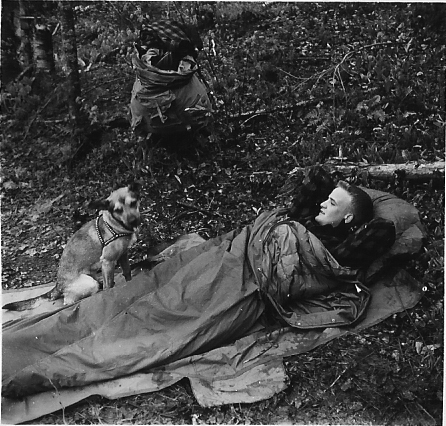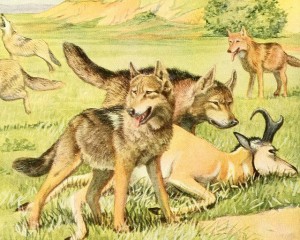I have a 90 year old Grandfather and a 15 year old pup. At Christmas this year I had them both in the same room at the same time for the first time in a long time. Got all that? The pup, Ruckas is a mix of, well, mostly canine DNA I would imagine, probably a good bit terrier and dalmatian. Who can say for sure? I first met him 15 years ago next month, at the time he was what turned out to be, a 5 week old 5 pound puppy at the local Humane Society. It was my 20th birthday and we’ve been together ever since. The Grandfather is 100% Norwegian stock, born of immigrant parents in Brooklyn, I first met him about 35 years ago next month on my actual birthday.

Ruckas has started showing signs of age in the last few months, he now has increasingly more trouble walking mainly due to Arthritis. My Grandfather has some of the same. What got me to thinking was a comment my Grandfather made. He said “it is a little un-nerving to see the same aliments in animals that I see and feel in myself. You don’t think of a dog as having the same arc of life as we do and at the same time you wonder if he understands what is happening. We humans learn and experience aging long before we get to it, for a dog you wonder, how do they process it and if it might not be easier for them taking each day as it comes and not focusing down the road so to speak.”
That statement took me aback. We know that dogs suffer the same aliments as humans and every other species that depends on humans and our modern food supply for nourishment. However, thinking about the arc of life for man’s best friend and man made me realize there are deeper similarities than are immediately evident. The first being that trauma or injury, at least for mostly indoor dogs and humans, is no longer the major cause of a shortened lifespan. There are no predators, or rival dogs out for the throat, in the first world is it highly unlikely for you to be killed in conflict, there are however the diseases of society. Humans like dogs, are pack animals. In pre-history nature, the theory is, like canines, the weakest members were picked off by predators or nature if they got to that stage. Which few probably did because of the overall hazardous nature of pre-history life. Today, in modern life, a rampant mastodon or vicious rival are highly unlikely to end your or Fido’s time among us. So we are finding the end range of natural life expectancy, or are we?
Anecdotally, I’ve heard stories from local farmers who had dogs that lived and worked into their 20’s. Several of those I have actually managed to confirm, in each case the dogs were never fed inside of the modern food supply. They all ate almost nothing but actual animal products including eggs according to their owners and for the most part seemed healthy up to the end. We see this in a way with humans too, usually by way of a news story covering a 114 year old “anomaly” that still eats fatback and eggs and greens and offal or whatever the pre-modern food of their culture is. A food culture that generally tends to defy all generally accepted widespread notions of “health.” However, what if they are not the anomaly but the reality. What if the modern culture is in fact our biggest cause of death? Mark Sisson of Mark’s Daily Apple has a theory that the human machine is designed to last until at least 120 if it is taken care of. That is all parts, including hips, knees, heart, kidneys and functioning brain are designed to last 12 decades of life. How is it modern humans are burning through all of the above, sometimes in as few as 40 years?
In dogs we have come to realize that we harm our best friend’s by giving them a diet that consists mostly of grains, that is to say most commercial dog food and we help them by feeding them a version to closer to what their ancestors ate in wild. We have no problem buying this idea for our animals, at least our companion animals. You transfer this idea to people and they lose their minds. Yet, the health parallels are there. Canines are essentially strict carnivores in the wild, whereas humans are omnivores who on average through history got the majority of their daily energy from animal products.

So by replicating a natural human diet we could all find our natural life expectancy? In theory, yes. In reality probably not. If you could do your DNA testing and find your genetic heritage and then eat only what would have been a native part of the diet for the pre-agricultural people of that area you might help yourself out. In actuality you would probably find out that 1) no one knows exactly what was eaten then or there, 2) those species may or may not exist or be endangered 3) if the species are still in existence they are going to be altered by human interference on the planet by way of environmental pollution and/or chemical residue and 4) you probably don’t have 6-10 hours a day to devote to your eating habit as pre-society man did. So for our furry friends this is a much easier task and possibly a way for us to help them avoid some of the chronic diseases we are faced. For humans, we have to take a less nuanced view and look at foods that are probably similar, or in the least don’t have the marks of industrial society all over them.
The last part of the statement from Christmas hasn’t been addressed yet and that deals with aging, getting older and reconciling that within yourself. The observation was to the effect of, getting older and dealing with the aging process could be easier for dogs because they don’t really know they are getting older, at least in the terms we humans have come to understand. Humans, of the modern world, understand what getting older means, or what we think it means. To first world Homo Sapiens, getting older means a loss of capacity, a loss of ability to do things, an increasing reliance on others, a loss of mobility and independence, and trouble accomplishing basic human tasks, like hygiene and feeding. However, I think as humans we have one trait unique in our own way, the ability to see, understand and rationalize death. Anyone who has been around animals for any amount of time knows, most animals understand inherently when their time among us is numbered. They feel it or sense it, Jack London noted that, hundreds of other authors have made mention of it. It is pretty clear if you’ve spent time around animals. However, I don’t think they see it coming a mile off, or like humans start obsessing about it, decades before the reality sets in.
At some point in the existence of the human, if they live long enough, their thoughts begin to be consumed with the idea that they have experienced more yesterdays than they will tomorrows. With some, those thoughts start to haunt their very existence and they start to ponder deeply, others take up new hobbies or bucket lists, still others try to right the wrongs they feel they have inflicted upon the world, others still withdraw into a deep depression. I’ve never seen any of the above with dogs. Never. Although our furry friends can’t comprehend or understand as they begin to lose senses or abilities, they seem to take it in stride and adjust. They can no longer jump up on the bed, they resign themselves to being lifted and wonder why they didn’t think of this shit a long time ago. They start favoring a paw, they learn to shift weight around it, but most seem just as content and happy at this time as they did chasing butterflies at eight months. Can we say the same as humans? Or do we focus too much on what we know is the end of the story, wether we like it or not? Knowing there isn’t a damn thing we can do about it. Is this a case of ignorance being bliss or is it something else?
Personally I think it is a prime example of the ego of mankind. We, the collective we, think we can change everything. We can move mountains and put people on the moon, we think we can change the entire climate of the earth in less than 100 years so we begin to think we can change everything, including death. No matter our power we can’t. Maybe delay, or change the date ever so slightly but not alter to any meaningful manner. The end comes for each one of us. Dogs know this. They have seen it, and I feel understand it but they don’t dwell on it because it isn’t something for them to fear. It is just another part of life.
So yes, I feel like aging is easier on dogs. They may not have the benefit of learning to understand aging but they have the innate ability to maintain their own perspective if given the chance. Dogs do mourn. I’ve witnessed it, both when they lose a furry friend and when they lose a human, but dogs don’t mourn for themselves as humans are apt to do. In reality we could learn much from them especially if we take the time to listen. They say one of the greatest tragedies of life is that we outlive our dogs but I’m sure it is for the best as we humans have the capacity to rationalize it whereas the dog would wonder what they did wrong to be abandoned.
Until next time
Keep it real and keep it rural,
Lee
